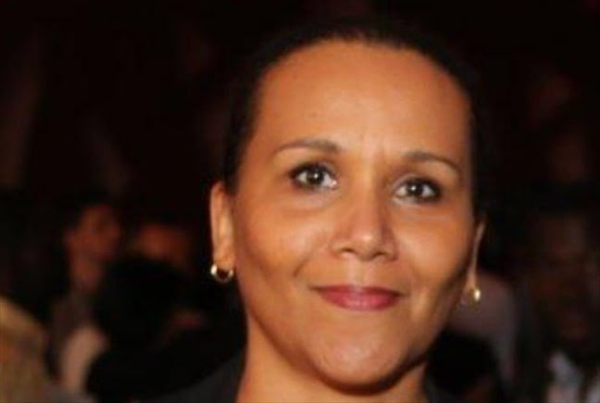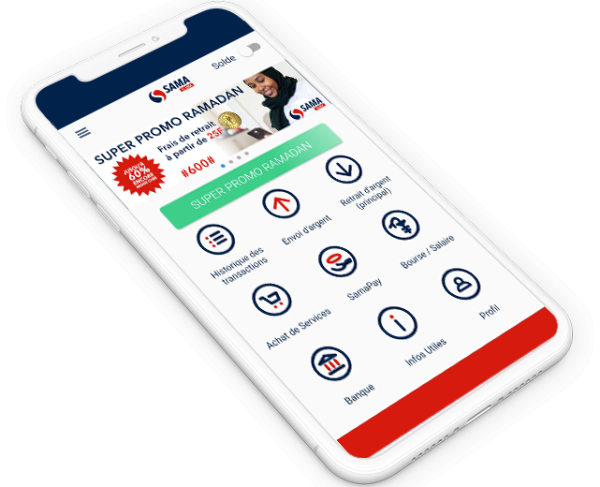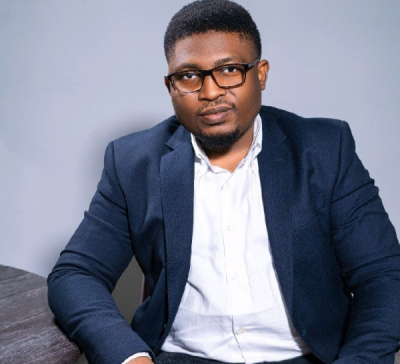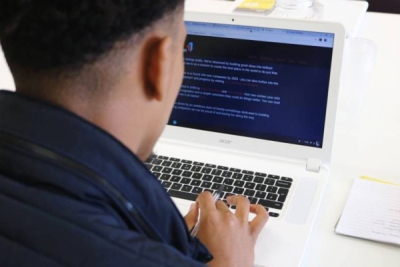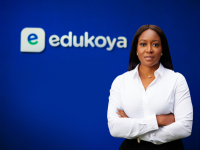In Africa, telecom operators used to shun rural areas, which were deemed not attractive enough. However, with the acceleration of digital transformation, most of them are operating strategic repositioning.
Last Tuesday, Orange -through Orange Côte d'Ivoire- announced a service agreement with tech innovation company Vanu Inc to extend its network coverage in Côte d'Ivoire, Burkina Faso and Liberia. The agreement includes the provision of technology upgrades and will be based on the innovative "Network-as-a-Service" (NaaS) model. It will begin with the rollout of 1,070 sites, including 700 in Côte d'Ivoire, 170 in Burkina Faso and 200 in Liberia.
According to Nafy Coulibaly (photo), Orange's deputy general manager in charge of operations in Côte d'Ivoire, Burkina Faso and Liberia, "Orange will roll out its services by strategically improving/increasing its network coverage so that no one is left behind.”
“Our goal is to provide free and open access to digital services, anywhere and to as many people as possible [...] to make digital services accessible to millions of people in rural areas of Côte d'Ivoire, Burkina Faso and Liberia who were not covered before,” she added.
The partnership between Orange Côte d'Ivoire and Vanu, Inc. is part of Orange's IDEAL program, which aims to extend network coverage in rural areas to 20 million people through the construction of 5,000 sites over four years. Rural areas in Africa, where a large proportion of the population still resides, are poorly covered by telecom networks. Yet, they have high-growth potential.
By strengthening its presence in rural areas, Orange Group is moving to increase its subscriber base, facilitate access to digital services and ultimately become the main operator in the targeted markets.
Muriel Edjo
From Mali, where it has established a strong base, the startup wants to conquer other African countries. It has already taken initial steps in that regard by entering two additional countries.
Sama Money is a fintech solution developed by a Malian eponymous start-up. It allows its users to send money anywhere in Mali at rates 60% cheaper than the competition.
On its website, the fintech startup behind the solution explains that it aims to boost financial inclusion in Africa. For that purpose, it “developed an innovative and accessible system that offers not only very competitive rates but also a multi-channel solution that can be used with or without an Internet connection.” It also offers additional services that can be paid fee-free using the Sama e-wallet”
The solution is accessible via a mobile app, available for Android and iOS devices. Once they sign up with a Sama account, users can access the various services offered, including money transfers and withdrawals, electricity and water bill payments, airtime top-ups, etc.
It is worth noting that several institutions have adopted Sama Money for various payments, including Covid-19 financial assistance, scholarship, insurance, salaries, and pensions. It is also accessible via a USSD code, which allows rural communities with no access to the internet to use its services.
According to PlayStore data, the Android version of its mobile app has already been downloaded more than 100,000 times. This year, the solution was scaled into Côte d’Ivoire and Burundi. It intends to enter more African markets.
Adoni Conrad Quenum
The serial entrepreneur is the mastermind behind several tech solutions. He also developed Africa’s first humanoid robot, becoming one of the continent’s leading innovators.
Chuks Ekwueme (photo) is a Nigerian businessman and CEO of the Uniccon Group of Companies, which he founded in 2020. With the Uniccon Group, he aims to help Africans -both businesses and households- access the most innovative and impactful solutions to realize their full potential.
Uniccon Group specializes in STEM (Science, Technology, Engineering, and Mathematics), software development, e-commerce, agricultural value chain supply, and export logistics. It is also an expert in jewelry and international business consulting and advisory.
In October 2022, at the GITEX trade fair -Dubai, October 10-14, 2022- its CEO unveiled the first humanoid robot it developed, a first in Africa. The robot, baptized Omeife, can converse in several local and international languages including Igbo, French, English, Arabic, and Afrikaans. During his presentation, Chuks explained that the humanoid robot was developed by the Stem Focus Lab -a Uniccon Group of Companies’ project- and completed two days before the GITEX 2022.
Chucks has developed several other solutions such as SmartMedicare, SmartWorks, SmartFree, Payfocuss, and CloudFocus. In April 2022, he launched a US$40 million cybersecurity solution. The solution, called Lossless Security, provides organizations with a full range of cyber protection solutions including endpoint defense, fraud detection, and data transfer encryption.
Since 2009, the serial entrepreneur is the director of Coevis World, a distributor of gypsum-based construction materials in Nigeria. From 2014 to 2016, he worked as the chief technical officer and consultant of Divine Rewardn Services, a supplier of construction chemicals and structural sealant technologies.
In October 2022, he won the Excellence in Technology and Community Development Award at the Peace Achievers International Award.
Melchior Koba
The funding comes almost one year after the U.S.-based international organization awarded initial capital to the three associations working for digital inclusion in Africa.
Last Tuesday, the Internet Society Foundation, the global organization that promotes internet access, granted the third round of grants to promote digital inclusion in Bangladesh, Colombia, and Senegal. The grants provided under the SCILLS (Strengthening Communities, Improving Lives and Livelihoods) program aim to support five innovative projects in the three countries.
"The SCILLS program reflects our commitment to promoting equitable digital transformation through Internet skills development. We are thrilled to renew our support to these five projects that are promoting digital inclusion for communities in Bangladesh, Colombia, and Senegal," said Sarah Armstrong, Executive Director of the Internet Society Foundation.
In Senegal, the foundation will fund two major projects to the tune of about US$400,000. The first, CTIC (Croissance TIC) Dakar, is a growth accelerator that will receive US$249,493 to train 30 early-stage entrepreneurs with high growth potential in entrepreneurial and digital skills and facilitate their access to financing.
The foundation will also fund SENUM (Synergy for Digital and Media Education), an association whose mission is to train and sensitize young people, their parents, and teachers on the educational use of digital technology. The US$149,421 granted to SENUM will be used to train teachers in the use of the Internet to improve the quality of education and help students acquire ICT skills through "tech clubs" and inter-school hackathons.
The SCILLS program, which is currently established in only one African country, will be expanded to Ghana in 2023. This is the second financing provided by the Internet Society Foundation in Senegal under the SCILLS program. In 2021, the foundation funded Association Jeunesse Espoir, the Simplon Foundation, and SENUM to help residents of beneficiary cities acquire digital skills that are essential for academic and economic improvement.
Samira Njoya
The platform aims to develop the Egyptian industrial sector, which grew by 6.5% and contributed 17% to GDP in 2021.
Egypt will soon launch a digital industrial platform. For that purpose, last November 2, the Ministry of Planning and Economic Development, the Ministry of Trade and Industry, and financial service provider E-finance -a subsidiary of eFinance Investment Group- signed a memorandum of cooperation for the development and management of the said platform.
The platform aims to offer investors and manufacturers improved services, accelerate the exploitation process and streamline the required procedures. Using the platform, firms can test the new services before presenting them to their clients.
According to Business Today Egypt, the “platform also offers other services such as cloud platforms, secure infrastructure, internet of things, cybersecurity applications, artificial intelligence, big data, and more.”
Like several African countries, Egypt is betting on digital transformation to accelerate its development. In 2017, the country became an attractive hub for large tech firms, thanks notably to strategic actions taken by the government.
The new platform is therefore one of the government’s actions to accelerate existing digital transformation efforts.
According to the statement announcing the signing, the platform will be launched at the Cairo ICT conference, which will be held on November 27-30, 2022, in collaboration with global digital transformation pioneers such as Pure Storage, Dell, IBM, Cisco, Redhat, Huawei, and many others.
The memorandum of cooperation is part of Egypt's Vision 2030 and its digital transformation strategy, which aims to enhance economic and social development across all sectors and make the country a digital hub of excellence in Africa.
Samira Njoya
Despite public authorities’ efforts, not everyone has access to education in Africa. Tech entrepreneurs are entering the field, leveraging digital solutions to bring education to everyone.
Foondamate is a study chatbot developed by a South African eponymous startup. The chatbot allows users access to online courses. The startup behind the bot was founded, in 2020, to help students access study materials.
"At FoondaMate, we believe talent is equally distributed yet opportunities are not. There are often competing factors that contribute to educational inequality – not just in Africa, but across the world – and our technology is helping to universally address these," said Dacod Magagula, CEO and co-founder of FoondaMate, the startup behind the chatbot.
The chatbot can be accessed on WhatsApp and Facebook Messenger. The bot, which speaks 13 languages (French, English, Sesotho, afrikaans, setswana, etc.), usually asks questions to assess first-time users’ education level. Then, they can assess the education materials and support they want. Among other things, they can download documents and memos, find solutions to maths problems and ask the meaning of words they don’t understand.
The startup claims more than 900,000 users in about 30 countries. "It's humbling to think that so many learners trust us to support their desire to learn, and that's a responsibility we take incredibly seriously," CEO Magagula indicated earlier this year when the startup raised US$2 million to accelerate its expansion.
Adoni Conrad Quenum
The serial entrepreneur has developed innovative solutions in the education, finance, and fashion sectors. Her undisputable impact on the African tech ecosystem has earned her several awards.
Honey Ogundeyi (photo) is a Nigerian serial entrepreneur and the founder/CEO of edtech startup Edukoya. She founded Edukoya, in 2021, to build an e-learning platform dedicated to Africans.
With that platform, she connects learners to digital courses and on-demand teachers for live education. "We are building the largest learning platform in Africa. We are solving a real problem of lack of access to quality education in Africa," Honey Ogundeyi said in October 2022. She offers Edukoya users- notably students in primary and secondary schools- access to content that helps them prepare for exams and do their homework. She also offers access to a question bank with step-by-step guidance and a personalized performance tracking system.
"This model is unique in that we are reaching parents and learners 100% online and supporting them not only across exams but also the day-to-day learning, homework, support, etc.," the serial entrepreneur explains.
Before Edukoya, Honey Ogundeyi co-founded Nigerian digital bank Kuda in 2018 and led the company's marketing team until 2019. She also founded the online fashion retailer Fashpa.com in 2014.
She entered the professional world, in 2004, when she began working as an associate at UBA Group. In 2006, she joined consulting firm McKinsey & Company as a senior analyst.
From 2009 to 2012, the entrepreneur worked at Ericsson successively as a Senior Business Consultant in Lagos, Head of Brand Management in Sweden, and Head of Brand Management for the Sub-Saharan Africa region. In 2012, she started working as an Industry Manager for Google. She has also been the country director of the Department for Digital, Culture, Media, and Sport (DCMS)’s UK-Nigeria Tech Hub, from 2019 to 2021.
In 2018, she was appointed to the Facebook SME Council for Nigeria. Two years earlier, the World Economic Forum had named her among the top 10 innovators in Africa and she also made it to the list of the 10 most influential young Nigerians under 40 in technology. In 2014, Forbes magazine included her on its list of the top 10 emerging women entrepreneurs to watch in Africa.
Melchior Koba
Technical and financial support is key for startup development. Such support is usually provided by accelerators, making their jobs crucial in Africa, where the number of startups created is ever-rising in recent years.
Venture capital firm 500 Global and GIZ (German agency for international cooperation) will launch a program to train accelerators to help them meet expectations in their respective digital ecosystems. The inaugural edition of that program, dubbed Bootcamp for Accelerator Managers (BAM), will launch next Monday. Fifteen accelerators have been selected to participate in that first edition. They are notably Orange Startup Studio, Westerwelle Startup Haus Kigali, Mountain Hub, Ennovate Ventures, WomHub, Africarise, Stanbic, Wennovation Hub, CTIC Dakar, Kosmos, Plug n Play, Norrsken Health Tech Africa, Venture Park, MEST Africa, and Growth Africa.
"500 Global is thrilled to be working alongside GIZ to ensure that African accelerators have the tools they need to support startups. 500 has been investing in companies in Africa for a decade and continues to be excited about the growth of the African tech ecosystem. We believe that the next phase of this evolution will be led by homegrown accelerators, like the ones joining BAM," said Mareme Dieng, the African lead for 500 Global.
The program will draw on a real-world project and scenario-based instruction, inspired by the work of 500 Global, which runs more than 80 accelerator programs worldwide, and GIZ's experience with innovation in Africa. It will start with a 5-day face-to-face training in Kenya. Then the participants will take part in a one-year virtual program.
In recent years, Africa’s digital economy has risen significantly. By leveraging digital and tech tools, entrepreneurs are developing innovative solutions for local problems. It is therefore urgent for the institutions supporting them technically and financially to up their technical and operational skills to offer effective support.
Let’s note that the accelerators selected for this first edition of the BAM were chosen based on their experience, seniority, market leadership, and track record. For Matthias Rehfeld, Head of GIZ's Make-IT in Africa program, "this program represents another cornerstone in Make-IT in Africa´s efforts to support African innovation on a local, pan-African and global scale.”
Samira Njoya
The move aims to introduce students to digital tools and at the same time save them from moving around with heavy books and bags.
Last Saturday, the Algerian Minister of National Education Abdelhakim Belabed met, remotely, with government officials and education directors. During the meeting, the government officials announced the upcoming inauguration of a program aimed at digitalizing textbooks.
"More than 3 million third, fourth and fifth grade pupils will be ridden of the textbooks, that add weight to their school bags, thanks to measures approved by the President of the Republic, Mr. Abdelmadjid Tebboune,” said Minister Abdelhakim Belabed while urging officials to make it easy for parents to acquire the digital textbooks.
In Algeria, the issue of the weight of school bags comes up every back-to-school time. Unions that deem the weight too heavy for students (because notably of the textbooks) have repeatedly called for a review of the educational program.
Last September, the Minister of National Education said that several "unprecedented measures" had been taken by the government to find definitive solutions to the problem. The most important of those solutions is the provision of electronic tablets to more than 1600 schools across the country.
Thanks to the tablets, students will access the digital version of their textbooks free of charge. They will access also additional resources such as videos, audio, animations, and interactive features.
The measures were included in the government program approved by the parliament. They are part of the project initiated to generalize the use of tablet computers in schools, starting from the 2022/2023 school year that kicked off in September 2022.
Samira Njoya
The solution aims to offer efficient logistics solutions to retailers in a context marked by rising transportation costs, which cost some retailers their operating profits.
Renda is a digital platform developed by a Nigerian eponymous start-up. It helps online businesses streamline their order fulfillment and retail distribution process across Africa.
The solution provides access to storage warehouses, inventory management, order processing, or even real-time delivery tracking solutions, making the delivery chain more reliable, and lifting a burden off businesses’ necks. Renda also allows van owners to get money by putting their vans for hire for deliveries.
To access its services, users have to fill out an online form, state the reason they are getting in touch and wait for the startup to contact them for further details.
Renda claims more than US$10 million of orders fulfilled in ten cities, 90+ warehouses, over 300 drivers, and a 96% fulfillment rate. It is among the nine African startups selected for the 2022 Techstars Toronto accelerator. It will thus undergo a 13-week mentoring program, a US$120,000 equity investment, and the opportunity to pitch for additional financing during demo days.
Adoni Conrad Quenum
More...
As an experienced startup ecosystem builder, he launched his incubator to support entrepreneurs who want to solve Uganda's problems using digital tools.
Richard Zulu (photo) is a founding partner and leader of Outbox Uganda, an innovation hub based in Kampala. He founded the incubator, in 2012, to support businesses in their development stage.
Through Outbox -a Google for Startups’ partner- he helps new and aspiring African entrepreneurs interested in using technology to solve Uganda's problems. He provides entrepreneurs with a space to work, and access mentorship, training, markets, and financing.
‘It was about working with entrepreneurs, making sure they succeed, taking them through the process of how they go about the legal aspects, marketing, branding, building structures of a company and going as far as helping them to launch to market,’ he was explaining back in 2018.
With Outbox partners, he also organizes challenges to reward the best technological solutions in areas such as education, finance, agriculture, media, and entertainment. Through its project Primaa, the incubator is also building low-cost environmental monitoring stations to improve the availability of OpenData on air quality in African urban centers.
Richard Zulu is a former leader of the Kampala chapter of the Google Developer Group and a 2014 fellow of Acumen East Africa. He is also the director of the Kampala chapter of Startup Grind, a global community that aims to inspire, educate, and network entrepreneurs.
He entered the professional world, in 2010, working as a network administrator at Makerere University’s directorate for ICT support. A year later, while still at the ICT support directorate, he co-organized the Garage48 Kampala- a Bootcamp and startup hackathon series- and Start-up Weekend Kampala 2012, a tech Bootcamp.
In 2014, design studio IDEO.org hired him as the community manager of Amplify, its series of 10 design challenges focused on creating innovative solutions to pressing development problems. In August 2016, he officiated as a part-time innovative justice agent for Hiil, The Hague Institute for Innovation of Law. He has also worked as an Open Government Fellow at Code For Africa, an African network of labs that uses technology and OpenData to build digital solutions. In 2021, he joined Plan International as a human-centered design consultant for the Playful Futures program.
Melchior Koba
Yango is stepping up its actions in Cameroon. In July, the company launched a bike hailing service in Douala.
Last Wednesday, ride-hailing service Yango announced the upcoming launch of the IT education project Practicum in Cameroon to boost digital education.
The Practicum project will allow Cameroonians to acquire practical experience in modern and sought-after professions like computer science, coding and web development through experiments.
"As a carpooling application, Yango is constantly taking action to boost digital adoption. By providing access to this online platform, we want to continue our mission and expand Cameroonians' access to technology and knowledge by providing more learning options. In other regions, we have successfully implemented Practicum in several fields including education, rehabilitation, and advanced training. Our team is confident that they will achieve great results in Cameroon and train more tech experts to drive development in the local market," said Didier Theze, Yango Country Manager in Cameroon.
Yango entered the Cameroonian market on November 15, 2021. Within just one year, its popularity has grown significantly and, it intends to go up a notch by giving Cameroonians the opportunity to learn through Practicum, a US-based online platform. The platform organizes intensive boot camps that equip learners with essential skills to become more effective in the job market. It claims 87% of its alumni have found a tech job in the six months after completing the boot camps.
In Cameroon, though the effective launch date is still unknown, we know that the boot camps offered will include data analytics and web development as those professions are among the most in-demand in the region and contribute to the country’s economy. The courses to be taught in Cameroon were developed with contributions from Yango's engineers, who contributed their development and integration expertise for effective impacts.
Samira Njoya
The African startup ecosystem is currently dominated by the fintech segments, probably because of the continent’s low financial inclusion rate. The segment has become so attractive to investors with ever-rising VC financing and the number of innovative solutions developed by enterpreneurs is also on the rise.
Gwiza is a fintech solution developed by a Rwandan eponymous startup. It allows users to pay utility bills, manage their expenses, contribute to group events, donate to charities or even save money individually or join a group to save collectively.
Through its mobile -Android and iOS- app and USSD code (*737#), it allows users to carry out various financial operations or enter a password to access the collective savings group they belong to. Users who want to join new groups or create new ones can do so through the Gwiza Plus app or visit a nearby Gwiza office for more assistance.
Apart from allowing group savings, fundraising and bill payment, Gwiza also enables insurance subscriptions. Despite its features, which make it a worthy alternative to mainstream financial services, the startup is not yet gaining much traction. According to Play Store data, its Android app has been downloaded less than 100 times. It is true that with its USSD technology, it could be more popular in rural areas but, without official figures, nothing much can be said about it.
The fintech startup is among the six selected to participate in the second cohort of the Fintech Incubation program organized by the Co-Creation Hub (CcHub), Google, the Rwandan Ministry of ICT and the Mojaloop Foundation. In December 2022, in the framework of the program, it will present its idea to potential investors.
Adoni Conrad Quenum
After his graduate studies in England, he returned to his native country to build his accelerator for effective support to techstart-ups.
Abdigani Diriye (photo) is a Somali-born computer scientist and tech innovator. He is, since 2014, the co-founder and director of Innovate Ventures, the first and leading startup accelerator in Somaliland and Somalia.
He co-founded the accelerator, in 2012, with two partners, to support “ambitious startups who use technology to change the world.” From inception to date, Innovate Ventures claims over US$150,000 invested in more than 54 startups. Its director also co-founded, in 2021, Bloom, a fintech startup that allows East Africans to save in US dollars and spend in local currencies. In 2011, he co-founded the professional network Worldwide Somali Students & Professionals, which he led till 2015.
From 2009 to 2012, Abdigani Diriye completed research internships at institutions including The Open University, Microsoft, and FX Palo Alto Laboratory in the US. He was then hired by Carnegie Mellon University as a postdoctoral researcher.
In 2013, IBM appointed him as a researcher and in 2016, he became the company's research director. With his team, he develops a machine learning approach that leverages new data sources to assess the financial profiles and credit scores of hundreds of millions of Africans.
From 2019 to 2021, he worked as a research manager at Amazon, where he helped develop new models that allow Alexa, Amazon's virtual assistant, to speak more naturally with users.
Over the course of his entrepreneurial career, he has won several awards and recognitions. For instance, he was named among MIT Technology Review's 35 Innovators Under 35. The following year, he was on the Quartz’s list of the top 30 African Innovators. In 2020, Choiseul Institute named him one of the 100 young economic leaders in Africa.
"I’m humbled to be included among CEOs and other business leaders in the rankings released by Institut Choiseul. I’m also excited that they are beginning to include scientists on the list, and recognizing the prominent role science will have to play in accelerating economic development in Africa," the computer scientist said while acknowledging the Choiseul ranking.
In 2017, Abdigani Diriye became a NEF (Next Einstein Forum) Fellow and TED Fellow. From August 2018 to November 2019, he was a member of the World Economic Forum's Global Future Council on Innovation Ecosystems.
Melchior Koba


